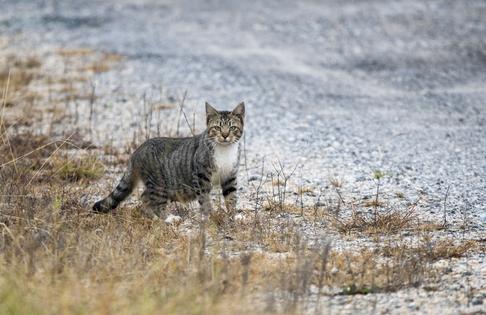My Pet World: Feral cats, wildlife, and the trouble with 'people like me'
Dear Cathy,
I read your advice, "Preparing Feral Cats for Winter." While our country is riddled with invasive species of plants, animals, and insects, feral cats are also invasive, invading the limited habitats of today's urban and rural landscapes.
The article mentions you as a "pet expert," yet you seem to lack significant knowledge about the dire state of habitats for native wildlife. A brief look at rural areas in February would reveal the desperate conditions for songbirds and other species.
Feral cats exacerbate these challenges, causing the loss of millions of songbirds annually and preying on other animals. Their instinct to kill, even without consuming prey, makes their presence especially harmful.
Must we accommodate feral cats at the expense of native wildlife? Are they "more deserving" as ground predators? While I take issue with feral cats, I have an even bigger problem with people like you, who hold them so dear yet disregard the imbalance they create outdoors.
– Scott, Bennington, Nebraska
Dear Scott,
Thank you for your letter. While I may be one of those pet lovers you're not too fond of, I assure you that my goal is always to work toward solutions that help all animals. While I may be a "pet expert," I don't claim to be a wildlife expert. However, I do recognize the impact cats can have on their environment if left unmanaged.
Interestingly, many environmental groups — including bird organizations — support humane approaches like trap-neuter-return (TNR) programs. These programs work to prevent new generations of feral cats, gradually reducing population numbers without resorting to capturing and killing.
By neutering or spaying, vaccinating, and returning cats to their territories, TNR helps stabilize colonies, prevents new cats from moving in, and reduces their impact over time. Volunteers who feed these cats also play an essential role in reducing their reliance on hunting for food, further benefiting local wildlife.
The key to solving this problem, however, lies in convincing pet owners not to abandon their cats in the first place (an unfortunately common problem) and to spay and neuter them. Feral cats exist because of these human actions – and inactions. It's our shared responsibility to find humane solutions that prioritize the well-being of these cats while also addressing the needs of the natural environment.
Thank you for sharing your thoughts. While "people like me" may approach this issue differently than you, there should always be room for thoughtful discussions to find common ground.
Dear Cathy,
I read your column on dogs barking at TVs and couldn't help but smile. My German Shepherd, Nora, is completely obsessed with the television, as I suspect many others of her kind are.
In fact, she managed to destroy a nice TV before I found a solution that works for us. Since this behavior seems to remain a lifelong obsession, I decided to "go with the flow" and got her a TV of her very own – an older tube-style TV, which no one wants anymore and is usually free and far more durable than newer TVs.
We added a little plexiglass and padding on the front, and now she can bark at it to her heart's content and can't hurt herself or the TV. That said, we still don’t leave a TV on without adult supervision.
— Mary, Tulsa, Oklahoma
Dear Mary,
I love your creative solution for Nora's TV obsession. It's clear you've gone above and beyond to accommodate her unique quirks while keeping your household peaceful — and your main TV intact. I especially appreciate your note about "adult supervision" — wise advice for any pet parent dealing with enthusiastic TV watchers. Thank you for reminding us how a little creativity can help find solutions for pets’ unique quirks and behaviors.
Local and national animal welfare organizations are stepping up to assist animals affected by the California fires. These groups are vital disaster responders, with staff and volunteers working tirelessly to save lives.
But the work takes its toll. Pasadena Humane is currently operating at five times its capacity, straining critical resources like finances, volunteers, and supplies.
If you want to help, donate to Pasadena Humane or any of the many other organizations helping animals and relocating them to safety, such as the San Diego Humane Society, Santa Barbara Humane, Best Friends Animal Society, Humane Society of Ventura County, Sacramento SPCA, Wallis Annenberg Pet Space, and Little Bitty Animal Sanctuary.
If you're nearby, consider volunteering at these shelters or fostering an animal receiving medical care or awaiting reunification with their owners. Every donation and volunteer effort makes a meaningful difference for these groups and the animals during a crisis.
_____
_____
========
(Cathy M. Rosenthal is a longtime animal advocate, author, columnist and pet expert who has more than 25 years in the animal welfare field. Send your pet questions, stories and tips to cathy@petpundit.com. Please include your name, city, and state. You can follow her @cathymrosenthal.)
©2025 Tribune Content Agency, LLC.
(c) 2025 DISTRIBUTED BY TRIBUNE MEDIA SERVICES, INC.












Comments